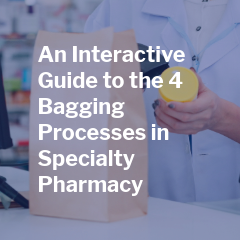
This visual helps illustrate the nuances of each type of bagging in specialty pharmacy and what it may mean for your health system.
Health systems can achieve more by addressing challenges with specialty drug inventory.
By
Date
February 06, 2023

Read time: 4 minutes
By: Maggie McCune
Specialty drugs, which continue to grow in number and popularity, are used to prevent and treat a range of diseases from autoimmune disorders to cancer. These specialized medications provide lifesaving treatment options for patients with hard-to-treat illnesses and continue to grow in usage throughout the United States.
The growth of specialty drugs presents both unique opportunities and challenges to health systems, including the ability to effectively treat acute, chronic, and rare illnesses while also managing treatment costs, product availability, storage requirements, and more. These opportunities and challenges make it crucial for health systems to develop a specialty drug strategy in partnership with their wholesale specialty distributor, such as McKesson, to help with procurement strategies and inventory management.
A significant share of the specialty drug market in the U.S. belongs to companies that dedicate major resources to research and development. These companies focus on products used in the treatment of oncology, immune and blood disorders, and more.
The continuing escalation of cancer and other diseases in the United States and beyond has created a need for therapies and new drugs that work effectively against hard-to-treat illnesses. Key pharmaceutical companies are collaborating to research and develop specialty drugs more efficiently and contribute to the specialty drug pipeline.
Due to the complex nature of specialty drugs, it is extremely important that health systems ensure that they are leveraging partnerships and resources to optimize their specialty pharmacy services so that patients receive the most timely and high quality of care possible. Specialty wholesale distributors, including McKesson, have the expertise in dealing with the complexity of specialty drug inventory management, storage, and more.
Specialty distributors may offer consignment contracts in which medication orders are delivered to and stored by the hospital — yet do not hold the hospital financially liable for unused product. A consignment program is ideal for specialty medications, providing instant access, reducing the risk of product expiration to eliminate waste, and controlling costs.
McKesson Plasma and Biologics (MPB) provides specialty drug distribution for an expansive portfolio of plasma-derived products, biologics, and other specialty drugs from a single source. The MPB Consigned Inventory Management Program supports hospitals in managing the capital and inventory of high-cost biologics that target rare diseases, providing a variety of biologic products to have on hand when needed without being responsible for the cost of the drug until its use. All McKesson health system and hospital customers that use MPB as their primary distributor of plasma and biologics are eligible to participate in the program.
Learn how McKesson’s Specialty and Plasma Drug Distribution for Pharmacies can help your health system achieve more.
 Maggie McCune is the Vice President of Sales Operations for McKesson Plasma and Biologics and is responsible for leading strategic operational and sales effectiveness initiatives. In her previous role as Director of New Business Development, Maggie was responsible for supporting McKesson Plasma and Biologics growth within health systems. She has over fifteen years of experience in and around health system specialty pharmacy sales and operations and is a dynamic leader with a firm commitment toward providing superior service to health system customers through specialty distribution activities.
Maggie McCune is the Vice President of Sales Operations for McKesson Plasma and Biologics and is responsible for leading strategic operational and sales effectiveness initiatives. In her previous role as Director of New Business Development, Maggie was responsible for supporting McKesson Plasma and Biologics growth within health systems. She has over fifteen years of experience in and around health system specialty pharmacy sales and operations and is a dynamic leader with a firm commitment toward providing superior service to health system customers through specialty distribution activities.
Click to learn how McKesson helps health systems achieve more.